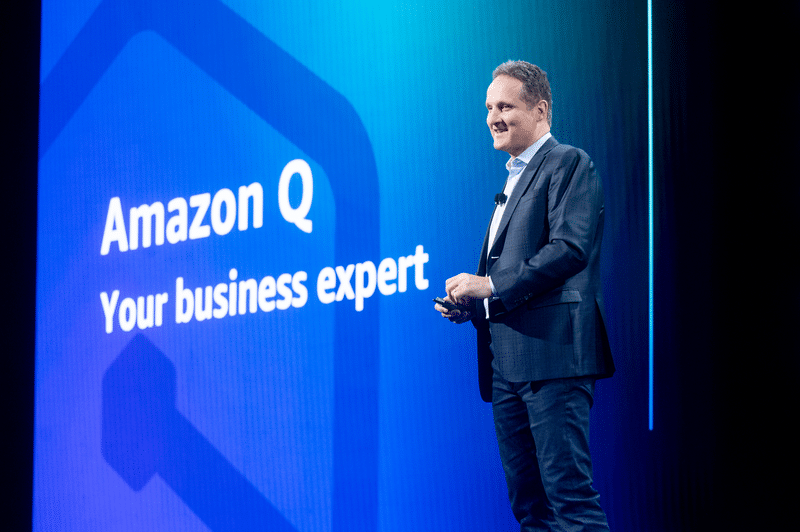Amazon Web Services is currently underway in Las Vegas, hosting its AWS re:Invent event that commenced on November 27 and will extend until December 1. The event has once again proven to be a hub of groundbreaking technological advancements. It saw a flurry of announcements and launches about recent developments, especially in light of the heightened competition among cloud providers striving to meet the increasing demand for AI solutions.
AWS CEO Adam Selipsky’s keynote address has set the event’s tone, emphasising the company’s strong commitment to continuous innovation and robust position in the tech landscape.
In case you missed it, here’s a quick look into some of the biggest announcements and launches at re:Invent 2023:
Amazon Q
Amazon Q stole the spotlight as an AI-powered chatbot designed exclusively for AWS customers. Trained on an extensive 17 years’ worth of AWS knowledge, Amazon Q goes beyond conventional chatbots. It can easily engage in conversations, generate content, and take actions based on an understanding of systems, data repositories, and operations. This innovation marks a significant step forward in enhancing user interactions with AWS services.

SageMaker HyperPod
The SageMaker HyperPod is a purpose-built service for training and fine-tuning large language models. Offering a distributed cluster with accelerated instances, optimized for efficient training, this innovation speeds up the training process. AWS continues to empower developers with tools that enhance the capabilities of natural language processing.
AWS Titan Image Generator
In a surprising move, Amazon introduced its image generation tool, the Titan Image Generator. Available in preview for AWS customers, this tool can create new images based on text descriptions or customize existing images. As image-based applications continue to rise, AWS positions itself as a comprehensive solution provider in the AI and image processing domains.

Amazon S3 Express One Zone
For data-intensive applications such as AI/ML training, AWS introduced Amazon S3 Express One Zone. This update to the S3 object storage service provides a new high-performance and low-latency tier. The One Zone tier promises a significant performance improvement, catering to the increasing demand for faster and more efficient data processing.
Guardrails for Amazon Bedrock
To address the need for fine-tuned control over language models, AWS introduced Guardrails for Amazon Bedrock. This tool empowers companies to define and limit the language used by AI models, ensuring more precise and controlled responses. By setting boundaries on model behaviour, Guardrails for Amazon Bedrock enhances the reliability and relevance of AI-generated content.
New AWS-designed AI Chips
The unveiling of AWS Trainium2 and Graviton4 chips underscores AWS’s commitment to advancing AI hardware. While Trainium2 focuses on model training, Graviton4 is dedicated to inferencing. These chips promise up to 4x better performance and 2x better energy efficiency, pushing the boundaries of what’s achievable in AI model processing.

Neptune Analytics
AWS introduced Neptune Analytics, a cutting-edge tool that seamlessly integrates graph and vector databases. This innovation allows customers to analyze existing Neptune graph data or data lakes on S3 storage, leveraging vector search to extract key insights. Neptune Analytics promises to be a game-changer in data analysis and retrieval.
Clean Rooms ML
Addressing the growing concerns around data privacy, AWS unveiled Clean Rooms ML. This service enables AWS customers to deploy “lookalike” AI models without sharing proprietary data. An extension of AWS’ existing Clean Rooms product, Clean Rooms ML facilitates secure collaborations between companies, fostering innovation without compromising sensitive information.
Amazon One Palm-Scanning
Expanding on the Amazon One offering, AWS introduced Amazon One Enterprise, a palm-scanning identity service. This innovation enables companies to authenticate individuals entering physical premises securely. Originally designed for biometric payments, Amazon One Enterprise takes a step further in enhancing security protocols for physical access.





